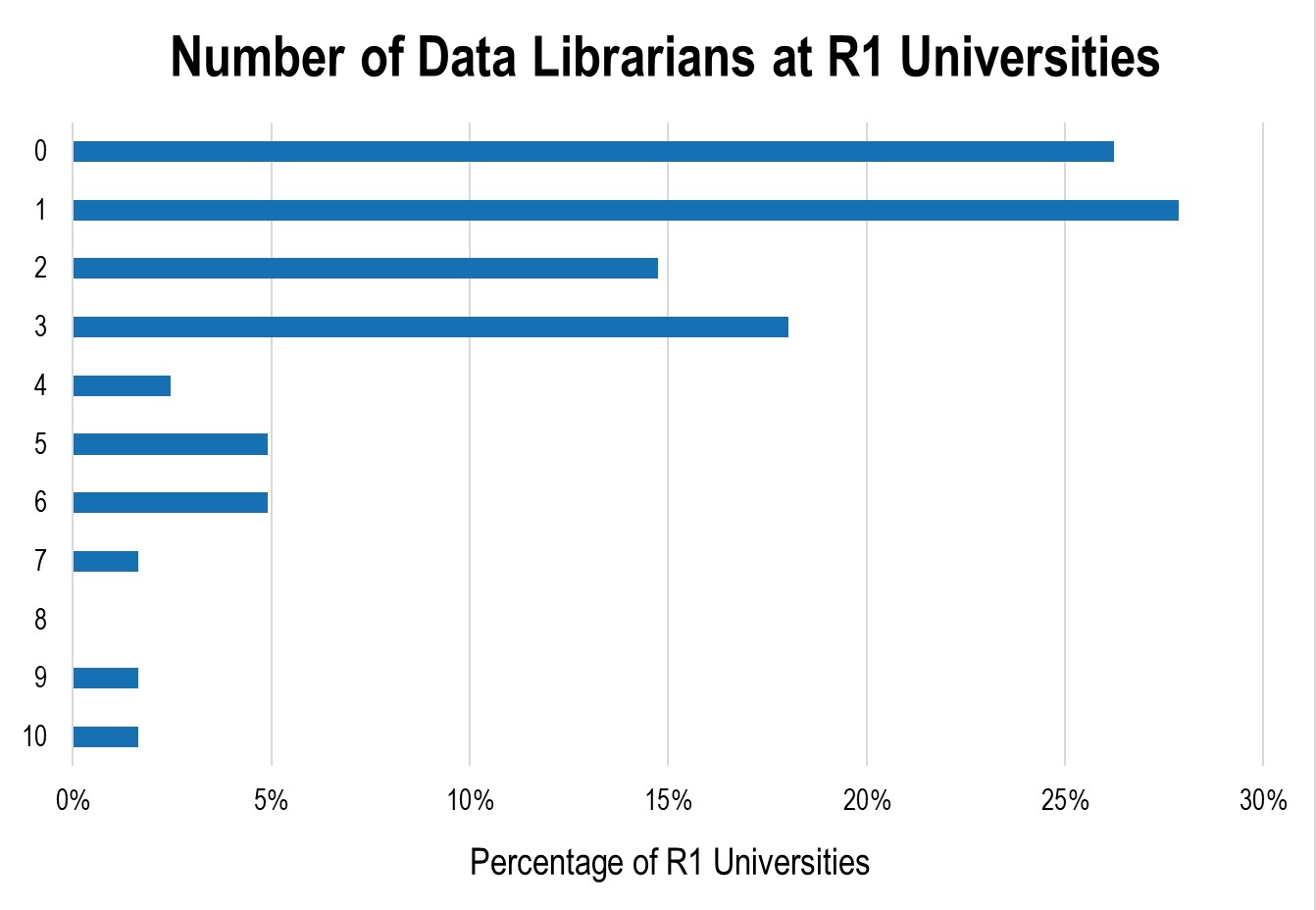Counting Data Librarians
How many data librarians does the average research university have?
As data science methodologies are embraced by more and more academic fields–and as funders and administrators increasingly prioritize big data projects–academic libraries are staffing up to meet a growing demand. “Research data services” is a term that encompasses a broad range of support functions that help students and scholars conduct research with data. Some of these include:
- Directing users to appropriate datasets for their research needs
- Training in coding languages, statistics, and software
- Supporting the creation of data visualizations and databases
- Consulting on research data management, preservation, and sharing
The Research Data Access & Preservation (RDAP) Association listserv has seen a spate of vacancy postings this summer for data librarian positions. Recent studies and presentations–including a keynote at the recent LibPMC conference–have also sought to define and draw attention to the important role of the data librarian. And the 2016 Ithaka S+R US Library Survey found that nearly 70 percent of library directors at doctoral universities were planning to increase staffing in roles focused on specialized faculty research support–including digital humanities, GIS, and data management–in the next five years, more than any other staffing category.
With so much development in this space, I wanted to take stock of current staffing levels for data services roles. I searched the online staff directories of the 131 US universities currently classified as R1 (“doctoral universities: very high research activity”). I looked for individuals with “data” in their job title, such as “data services librarian” and “research data management librarian.” I excluded metadata librarians and others whose roles focus on working with the library’s internal data, and I also counted “digital curation,” “GIS/visualization,” and a few other, similar titles. This means that I wasn’t counting all the library staff who might sometimes help users work with data, like subject liaisons and scholarly communications librarians–only those whose jobs are primarily focused on data services.
Around a quarter of R1 universities don’t have any dedicated data librarians on staff. Another quarter have only one dedicated staff member. Around a third have a small team of two to three data librarians, while the remaining small proportion of R1 libraries have large research data teams of four to ten. The average number of data librarians per R1 university is a little over two.
The results of this simple inventory raise a number of important strategic issues for research libraries moving forward.
Some of the 40 or so R1 universities which don’t currently employ any data librarians may be considering whether to play “catch up” and hire one post haste. On the one hand, the demand for research data services seems likely to grow exponentially as research methodologies adapt to the digital age. On the other, rushing into hiring staff without developing a robust plan for their role is always risky. We are entering an era when nearly every reference, liaison, instruction, or scholarly communications librarian will benefit from familiarity with the research data landscape.
For libraries that are already robustly staffed in data services, cooperative arrangements with other institutions or with data communities can give data librarians the opportunity to develop professionally while exponentially growing the range of specialized expertise areas available to local researchers. The pilot phase of the Data Curation Network represents a promising model for this type of cross-institutional engagement.
Finally, on most R1 campuses, research data services are provided by a patchwork of organizational units in addition to libraries, including IT departments, specialized centers and institutes, and core facilities. Faculty and students also help one another figure out solutions to data science problems, both through formal coursework and collaborations and through informal relationships. Libraries must think carefully about how to position their unique expertise in relation to these other service providers in order to provide coordinated, rather than competing, services.
A great deal of work remains to be done to understand how faculty interact with data services across university campuses, both as instructors and as researchers. Ithaka S+R is contributing to this rapidly developing space by launching two new collaborative research projects on Supporting Teaching with Data in the Social Sciences and Supporting Big Data Research. Participants will work alongside Ithaka S+R to conduct a deep dive into their faculty’s needs and craft evidence-based recommendations. To find out more about having your library participate as a research site for these or future projects, please email danielle.cooper@ithaka.org.

Pingbacks
The Research Data Sharing Business Landscape - The Scholarly Kitchen
Two Competing Visions for Research Data Sharing - The Scholarly Kitchen
Comments
I have been working on a similar type study. In the context of the decline of historic library services I have been looking at libraries at universities similar to mine, R2 with engineering degrees, to see where the professional librarian resources are allocated. My methodology is similar in that I have looked at library webpages for job titles of librarians. I created 7 categories: Admin, Public services, tech services, reference/instruction, archives/special collections, technology, and other.
My overall question is what are librarians doing as traditional library services decline in demand. I am most interested in non R1 libraries since they have smaller budgets and are less likely to need or be able to create other services such as those related to data.
It is not very precise because there is a lot of interpretation involved. So far it looks like this:
77 Libraries
1463 total librarians
Admin 12%
PS 5%
TS 19%
Ref/I 42%
Arch/S 14%
Tech 5%
Other 3%
Doug, thanks so much for your comment and for sharing the preliminary results of your research. The growing ranks of data librarians definitely have to be placed in the context of changing demands, funding, and organizational structures within the library more broadly. If you're going to publish your study, please feel free to email me (rebecca.springer@ithaka.org) or tweet @rsspringer1 when it comes out - I'd love to read more.